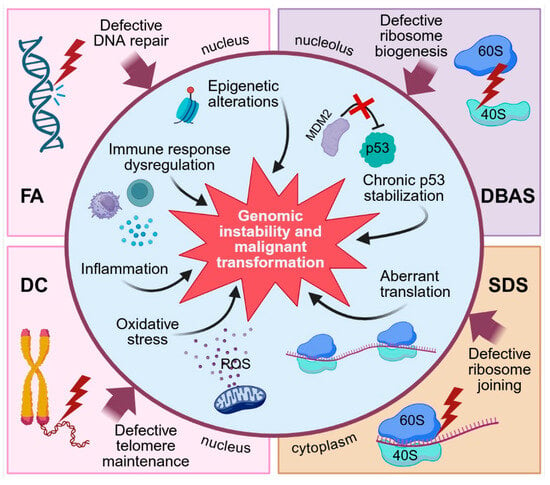Latest Review Papers in Molecular Oncology
A topical collection in International Journal of Molecular Sciences (ISSN 1422-0067). This collection belongs to the section "Molecular Oncology".
Viewed by 10790Editors
Interests: colorectal cancer; immunotherapy; inflammatory bowel diseases; anti-cancer drugs
Special Issues, Collections and Topics in MDPI journals
Interests: matrix biology; tumor microenvironment; matric metalloproteinases; extracellular vesicles; tissue remodeling; cell interactions; EMMPRIN
Special Issues, Collections and Topics in MDPI journals
Topical Collection Information
Dear Colleagues,
Through the use of diverse techniques and cutting-edge technologies, molecular oncology seeks to investigate and characterize the molecular alterations underlying the pathogenesis and progression of malignant diseases, with the ultimate goal of improving cancer prevention strategies and therapeutic approaches.
An increasing number of research teams have devoted significant efforts to the development of this field, substantially advancing our understanding of the molecular basis of cancer. By collecting high-quality review articles from scholars working at universities and research institutes worldwide, this Topic Collection aims to provide a comprehensive overview of the most recent advances, discoveries, and progress across all areas of molecular oncology. Full-length, comprehensive reviews are preferred.
Topics include, but are not limited to, the following:
- New insights into the molecular mechanisms of cancer growth, invasion, and metastasis
- Emerging technologies in cancer research (e.g., bioinformatics, proteomics, metabolomics, tissue arrays, imaging)
- Novel molecular biomarkers and cancer profiling for diagnosis, prognosis, stratification, and treatment efficacy
- Molecular interactions within the tumor microenvironment, including tumor–immune cell, tumor–stroma, and tumor–microbiota interactions
- Genomic profiling of human cancers, including genetics, epigenetics, and genomic instability
- Preclinical research leading to novel therapies based on molecular and cellular mechanisms, including gene therapy, nanomedicine-based treatments, biologics, cancer vaccines, and immunotherapies (e.g., oncolytic viruses, CAR T cells)
Dr. Carmine Stolfi
Dr. Eric Huet
Collection Editors
Manuscript Submission Information
Manuscripts should be submitted online at www.mdpi.com by registering and logging in to this website. Once you are registered, click here to go to the submission form. Manuscripts can be submitted until the deadline. All submissions that pass pre-check are peer-reviewed. Accepted papers will be published continuously in the journal (as soon as accepted) and will be listed together on the collection website. Research articles, review articles as well as short communications are invited. For planned papers, a title and short abstract (about 250 words) can be sent to the Editorial Office for assessment.
Submitted manuscripts should not have been published previously, nor be under consideration for publication elsewhere (except conference proceedings papers). All manuscripts are thoroughly refereed through a single-blind peer-review process. A guide for authors and other relevant information for submission of manuscripts is available on the Instructions for Authors page. International Journal of Molecular Sciences is an international peer-reviewed open access semimonthly journal published by MDPI.
Please visit the Instructions for Authors page before submitting a manuscript. There is an Article Processing Charge (APC) for publication in this open access journal. For details about the APC please see here. Submitted papers should be well formatted and use good English. Authors may use MDPI's English editing service prior to publication or during author revisions.
Keywords
- review
- molecular oncology
- cancer genetics and epigenetics
- cancer genomics development and progression of cancers
- metastasis
- tumor microenvironment
- novel therapies












